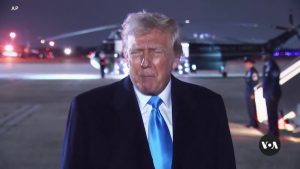Many federally funded scientists have either had their grants terminated or can’t access approved funding while the National Institutes of Health, the National Science Foundation and other science agencies work to comply with President Trump’s recent executive orders.
The orders, which researchers say are vague, ban funding for diversity, equity and inclusion; “gender ideology”; and green energy projects, among other issues.
The orders are just one of several actions in the last two weeks that have created uncertainty for researchers and scientists who rely on federal funding. Both the NIH and NSF paused grant review panels until Feb. 1, and last week, a now-enjoined and rescinded memo from the Office of Management and Budget threatened to freeze all federal grants and loans, which would have broader impact on colleges and research funding. (Neither the NIH nor the NSF responded to Inside Higher Ed’s questions about if the panels, which finalize grant awards, will resume this week.)
All of these disruptions leave researchers wondering when—or if—they’ll get the grant money they need to fund their research and livelihoods.
“I have no idea if I’ll still be granted the funds, or if my project is still eligible,” said an NSF-funded doctoral student at Northwestern University, who asked to remain anonymous for fear of losing a tentatively approved grant that’s still waiting to go through the frozen grant review panel. “Without it I can’t really move forward in my career because I don’t know if I’ll be able to finish my data collection. If I don’t finish that, I can’t finish my Ph.D. on time. I’m also about to run out of [institutional funding], so it’s extremely time sensitive.”
‘Is That DEI? ’
The NSF and NIH award colleges and universities billions of dollars a year to support research across a wide range of subjects, including medicine, engineering and artificial intelligence. If those funding sources are threatened, either the research stops or colleges will have to use their own resources to fill in the gaps.
But minimal communication from the federal agencies—the NSF last week directed institutions to “work with their research office to assist In complying with the executive orders”—has made it difficult for colleges and universities to offer more specific guidance or reassurance to their researchers.
“Our institution is just scrambling to figure out what DEI is and what programs will be affected,” the doctoral researcher said. “I study the development of disease, which tends to affect populations of certain ethnic and cultural backgrounds more than others. Is that DEI?”
Since Trump was elected in November, scientists have worried that the president would target federal research and data related to climate change or other topics he disagrees with. A team of researchers spent the last month working to save data sets, some of which went off-line in the two weeks since Trump retook the Oval Office. Adding to the concern for some researchers, several public health websites or data sets went dark Friday night, though some were restored as of Saturday afternoon, Science reported.
“The ambiguity and chaos is intended to make it difficult for faculty, staff and students to coalesce around message,” said Mia McIver, executive director of the American Association of University Professors, which is urging campus leaders not to “exercise anticipatory obedience,” or to acquiesce before they are legally required to. “These executive orders function as trial balloons from the Trump administration to see which areas of our civil society will be compliant and which areas will not.”
If higher education institutions don’t resist, it could allow Trump’s administration to “commandeer the educational mission of colleges and universities by having a chilling effect and intimidating faculty, staff and students,” McIver said. “Our faculty are inquiring into things that are going to make American’s lives better and healthier, and these executive orders put that work at risk.”
With so many unknowns about if, when or how the executive orders will be enforced, some universities are telling their faculty to carry on in the meantime.
“Please continue with business as usual unless you receive a stop-work order or termination notice for a specific project or award from your funding agency,” Northwestern’s research office posted on its website Friday. “Do not stop work based on rumor.”
But at institutions across the country, including Northwestern, the University of California system and Northern Arizona University, a number of faculty already know their projects have been terminated.
Funds Frozen, STEM Diversity Programs Terminated
On Jan. 22, Naomi Lee, an assistant professor of biochemistry at NAU, received a letter from the Department of Health and Human Services notifying her of the termination of the university’s NIH-funded funded Cultural and Academic Research Experience (CARE), which is designed to expose underrepresented high school students to STEM careers. The letter ordered Lee to immediately “stop work” on CARE, in accordance with the executive orders on “Ending Radical and Wasteful Government DEI Programs and Preferencing.”
That means Lee, who has directed CARE since 2019, no longer has money to pay her staff, the program costs or student stipends for the spring semester, though she said in an email she’s “confident” she can raise enough money to keep the program alive—in some form—even without NIH support.
But she also clarified that despite what Trump’s orders say about the “discriminatory” intent of DEI efforts, her program has never been about excluding anyone.
“The program supports ALL students but focuses on underserved students,” Lee said. “The Trump administration criminalizes [diversity, equity, inclusion and accessibility]. America is diverse and will continue to diversify regardless of the efforts being taken to stop it.”
While the explicit mission of the CARE program may have made it an easy target for Trump’s anti-DEI sledgehammer, others are concerned that the broadly defined terms in Trump’s executive orders could jeopardize less obvious projects and programs.
“I don’t explicitly do DEI work. I work on plant genomes,” said Ben Stone, a postdoctoral fellow at the University of South Carolina whose salary is covered entirely by the National Science Foundation’s Postdoctoral Research Fellowships in Biology program. “But the executive order is vague enough that it can encompass a lot of things that are in almost every NSF proposal.”
Since 1997, the NSF has required applicants to complete a Broader Impacts section, which often includes reference to expanding or diversifying participation in STEM. The bipartisan CHIPS and Science Act, which Congress passed in August 2022, expanded on that idea, directing science agencies to focus on “improving accessibility and enhancing demographic, geographic and institutional diversity in STEM,” according to the NSF website.
Stone, who is nearing the end of his program and already has a faculty job lined up in August, said he’s confident he’ll land on his feet no matter what happens. But future students may not get the same opportunities the NSF offered him.
That’s because the grant that supports his research, which has a goal of “broadening participation of groups underrepresented in biology,” has already been flagged as “an archived funding opportunity” on the NSF website. It’s one of an unknown number of archived—or seemingly discontinued—grant programs at the NSF, which did not respond to Inside Higher Ed’s specific questions about how many grants it’s archived.
While Stone and others await decisions on if their grants will pass the Trump administration’s ideological tests, last week he wasn’t able to access his salary as he normally does through the NSF’s Award Cash Management $ervice.
Soon after he attempted to withdraw money last Tuesday, Stone and other grantees received an email from an NSF program officer stating that all transactions made through ACM$ on that date had been canceled while the agency is “working expeditiously” to review its programs, projects and activities to comply with Trump’s executive orders.
“This is not normal,” Stone said. “These are active, already awarded grants that are being frozen.”
(On Sunday, the NSF announced that it has restored access to the ACM$ and it is ready to accept payment requests, though it’s still unclear how the executive orders may influence approval and disbursement of those funds.)
Making Science Weaker?
Darby Saxbe, a psychology professor at the University of Southern California, said Thursday that she’s not sure if she’ll get the final installment of a $2 million, five-year NIH grant this month as planned. She uses that money to pay the salaries of junior researchers working on the project and doesn’t know if she’ll be able to pay them or cover their health insurance.
“Plus, we’re collecting really time-sensitive longitudinal data,” said Saxbe, who explained that her team has scanned the brains of the same group of children for seven years. “If we don’t have funds and can’t collect that data, we can’t just go out and find new families to do the study.”
Like most of her colleagues, she doesn’t know if the NIH will flag her professional research as DEI or not.
“You want to recruit a representative sample to avoid bias,” Saxbe said. “So, if you describe any of your procedures around doing that, or the racial makeup of your samples, or cultural considerations, it’s totally unclear to me if that counts as DEI.”
And despite Trump and his allies’ recent attacks on the NIH and the NSF as purveyors of inaccurate public health information and DEI initiatives, both agencies have historically thrived on bipartisan support and rigorous, independent scientific review.
“Injecting new criteria into grant applications based on partisanship and political agenda makes the science weaker,” Saxbe said. “Ironically, it does all the things Trump is accusing the current institutions of doing through DEI. This would create ideological rules that people have to follow in order to have their science considered.”








